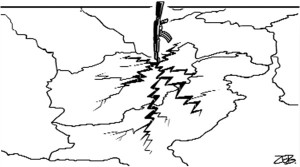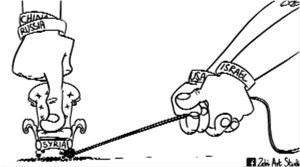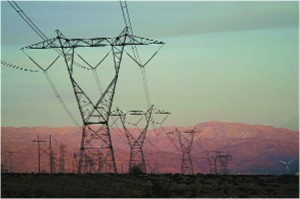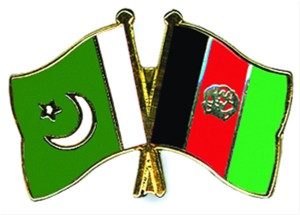
Man’s best friend
Sir,
At a time when more and more people are resorting to medication to relieve their pain, a new form of treatment is steadily growing in popularity. Across the world, dogs are being used to help people cope with mental and physical hindrances. Therapy dogs are a subcategory of service dogs; they undergo extensive training and can help people cope with mild to major disabilities. In addition to trained dogs, everyday puppies and adult dogs are used to help treat depression. Caring for a dog promotes a sense of responsibility and provides companionship for those who need it most. So how exactly can a dog be used as a treatment for depression?
Dogs are utilised in two main ways to help with depression. The first way in which dogs can help is when they are trained for that specific purpose. Therapy service dogs are highly trained, but they do not always belong to the person suffering from a disability. Instead, a handler takes the dog to different facilities to spend time with many patients. Dogs that belong to the patients live and act as everyday household pets, the only difference being that they are taught additional tasks such as retrieving medication. In the case of depression, the dog is trained to respond to the different moods of the patient. For instance, if the owner is sad or in tears, the dog knows to cuddle, lick away the tears, bring tissue, and initiate a game or other form of play. If the owner is stuck in a mood of apathy, the dog resorts to physical stimulation by trying to get the owner to pet or play. Depression is not the only psychiatric condition in which dogs can help people. Dogs are trained to help treat social phobia, post-traumatic stress, schizophrenia, and obsessive-compulsive disorder, among other things.
The other way in which a dog can be used to treat depression is very simple; depression can be treated starting with adopting a dog. Since dogs are lifelong companions and require a certain amount of responsibility, adopting a dog is sometimes recommended for people suffering from depression. Although these dogs will not be trained to respond to certain moods, they do have a calming and uplifting effect. The treatment process starts right from the time you bring the dog home. Taking care of the dog gives a person suffering from depression something to do; the person finds responsibility in taking care of an animal rather than focusing on their stresses. The dog acts as a companion, since depression can be spurred by loneliness. The owner has someone to talk to, share feelings, and play with. Since the animal is a typical dog, it begs for attention and exercise. Exercise has also been found to help people cope with depression. In essence, taking care of a pooch provides the owner with something to fill the time with and a friend with whom to spend their lives.
Dogs are not only used to treat serious problems; even someone looking for a little company can benefit from the companionship of a pet. If you feel that a dog can lift your spirits, visit your local animal shelter and consider rescuing a puppy. If you decide to adopt a pet, remember that you must take care of the pet and provide them with love and care. The pet needs a comfy place to sleep in, food for every meal, and daily exercise. It is not always easy to train and care for an animal, but it is always worth it.
Although dogs have not been cited with curing depression, they have been praised for helping people cope with the disorder. They visit nursing homes and psychiatric wards and give patients a chance to interact with, cuddle, and play with another living being.
Charles Henderson,
Lahore.
Kunduz spells trouble

Sir,
Despite Kunduz’s proximity with Tajikistan along the northern border of Afghanistan, the Taliban capturing and controlling the city is a significant development, one that has serious implications for Pakistan.
Why the mostly Pashtun Taliban chose Kunduz as the city to operate out of remains an intriguing questions. It’s worth noting that the city is widely viewed as the home ground of the Taliban’s non-Pashtun rival, the Northern Alliance. Ashraf Ghani has already shown meek capitulation by taking the route of the “Taliban are using humans as shields”. This could mean that the Taliban may not only consolidate their hold in the north, but could also begin their march towards Kabul, and then further south along the Pakistan border.
There also seems the possibility that the Afghan Taliban may announce an alliance with ISIS, similar to the one that TTP’s Khalid Khurasani announced some months ago. That would mean that Pakistan could potentially be facing an Afghanistan under heavy Daesh influence. Pakistan now has to be extra vigilant. The fresh offer of facilitating another round of talks, post-Ghani tirade, is likely to prove counterproductive.
Eschmall Sardar,
Hayatabad.
Palestine in UN
Sir,
It is a feather in the cap of everyone involved, including US President Obama, that the Palestinian flag has been raised for the first time at the United Nations, in effect recognising the Palestinian Authority as a separate independent state bordering Israel. This is a big achievement. Palestinian President Mahmoud Abbas kissed the flag and hoisted it, with tears of joy in his eyes, with Secretary General Ban-Ki Moon present at the historic occasion. President Abbas was right in saying that he was no longer bound by the agreements earlier signed with Israel, as the Palestinian flag was raised for the first time at the UN.
This development also rings out a warning; Israel has so far been ‘sparing’ the Palestinian Authority, considering Palestinians subjugated people languishing across a cemented wall at the mercy of Israelis. Now Israel may use its right of direct attack and invasion, considering it an enemy country. The responsibility to protect Palestine now lays with Arab states of the region, largely on Egypt, Saudi Arabia and others. They must do everything to strengthen the newly born state and bring a peaceful environment, without further conflicts, to the region. The Palestinian people must be freed from fear, and finally get to live their lives as they want.
Alya Alvi,
Rawalpindi.
Putin’s UN Speech

Sir,
Russia seems to have finally decided to end the unipolar supremacy of the US and its almost colonial-like policy of interference in the Middle East, redrawing geographical boundaries, seeking regime changes. It is unfortunate that US ambitions to control oil reserves in the Middle East and its tunnel like vision of securing Israel and supporting its unleashing of terror on Palestinians have provided an opportunity for terrorism to fill the vacuum created by the mindless destruction of comparatively stable regimes that existed in Libya, Iraq and its failed attempt at regime change in Syria.
One can only hope that Russia re-emerges as a balancing world power, in partnership with China, seeking a more reformed and constructive role in restoring world peace as the US political leadership starts following, in letter and spirit, the principles laid down by their founding fathers. It is the birth right of every human being to practice their faith, live securely within the borders of their countries; this right cannot be violated by any other country, however powerful they might be, including those who are permanent members of the UN Security Council.
Today, millions of refugees are fleeing Syria and Iraq to seek a land where they can get their basic rights to live free from the troubles of war. In the process of seeking the ‘promised land’, thousands have died while fleeing to Europe in overcrowded boats. The sufferings of Muslims across the world have increased manifold since the collapse of the former Soviet Union. Millions have died in unnecessary wars unleashed upon countries over issues such as WMDs etc, and the western world remains unmoved.
Ali Tariq,
Lahore.
NEPRA charge sheet

Sir,
NEPRA, in its report for 2014-15, has levelled very serious charges against the Ministry of Water and Power, declaring the shortfall in electricity production as “fake”. The report also alleges that consumers were overcharged through out-dated ‘Time Of Use’ metres and gross mismanagement in power generation and distribution systems. We live in a world where specialists are required for specialised jobs, yet we stick to the tradition of using a generic bureaucrat for everything. Pakistan’s power generation and energy crisis exists because of years of mismanagement, conflicts of interests, cronyism, and institutionalised corruption.
The practice of appointing elected politicians as ministers requires a developing country to have a system of checks and balances. Strong institution building remains an objective. In developed countries, the best-qualified specialists are selected to run state-owned enterprises, instead of cronies. Today, mismanagement in education, health, aviation, railways, financial institutions, state-owned banking, petroleum and gas, housing, and water and power are basically because of faulty appointments, political interference, lack of transparency and abuse of power by stakeholders within the political elite and the country’s establishment.
Performing Hajj and Umrah, which was a routine matter for the country, has become an agonising experience because the commercial corporate interests of tour operators and politicised appointments in the Ministry of Hajj and Directorate have relegated pilgrims’ convenience and safety as a priority.
The unfortunate reality is that there is no dearth of qualified economists, engineers, doctors, corporate managers, scientists, educationists, agriculture experts, pharmacists etc., in Pakistan. Yet, if the government chooses to appoint a medical doctor as an adviser on petroleum, a pharmacist as adviser on water and power, a pilot with no other qualifications or experience in aviation management as adviser aviation or the MD of a national airline, retired generals as vice chancellors, an engineer as adviser health, chartered accountants and MBAs as economists, then failure in all the abovementioned cases remains inevitable.
Malik Tariq
Lahore
Not a ‘brother country’

Sir,
Afghan President Ashraf Ghani says Pakistan is not a ‘brother country’. One can’t help but recall how he has lived in Pakistan for years. Even his western wife lived in the country with him. His kids were brought up in Pakistan, along with four millions Afghan refugees, whose exodus from Afghanistan started in the 70s and more than half of whom are still enjoying life in Pakistan. Wheat, rice, grains, cattle, clothes, households, kitchen items, petroleum products, building and construction materials, you name it, and odds are it goes to Afghanistan from Pakistan. The Afghans living in Pakistan have received identity cards, bought properties, set up businesses and commercial, transport and communication centres – from Khyber to Karachi. They have burdened Pakistan’s economy, and influenced society at large. Their children’s childrens are in Pakistani schools, with the parents refusing to go back despite the so-called peace in Afghanistan. Despite all this, Ghani claims Pakistan is not a ‘brother country’.
Afghanistan showed what its intentions were at the time of Pakistan’s formation by not recognising the country. Afghanistan clearly has the same intentions today.
Hamza Ali,
Islamabad.
Why the fuss?

Sir,
The latest 10-year $500 million Pakistani Eurobond issue last week has, in my opinion, come under unnecessary criticism in the country’s print media, mainly on two counts. First, the annual interest rate of 8.25% offered in this issue is high (same as was in the bond issue of April 2014), and secondly, investor response to this bond issue has been lukewarm as compared to the $2 billion Pakistani Eurobond issue of April 2014.
It is understandable as to why the Pakistani government has accepted the 8.25% interest rate for this latest issue. When the Pakistani Eurobond was issued in April 2014, the world ‘s economic outlook was very positive and the global financial markets were expecting that America’s interest rate, which was close to almost zero per cent, would remain the same for at least one year, or may be even longer. Since then, America’s economy has been growing impressively, and as a result, inflation is picking up in the country; inflation is close to the Fed’s target of 2%. As a result, financial markets are expecting that the Federal Reserve Board of America will soon start raising interest rates. There are clear signs from the Fed that interest rate hikes are on the cards. So if the markets are expecting an interest hike in future, how can Pakistan get a better interest rate on it’s latest Eurobond issue? Financial markets’ future expectations of interest rate hikes in the US are reflected in the 8.25% interest rate that Pakistan has accepted for its latest 10 Eurobond issue.
Why did international investors not show as much exuberance for Pakistani Eurobonds this time as they did in April 2014, one might ask? The answer being global financial markets are uncertain and jittery following the slowdown of the Chinese economy in the last three months.
The global economy is facing two main challenges right now. Firstly, US interest rates will go up, which will suck liquidity from developing economies. The second being that China’s GDP growth is slowing down. These two unnerving developments have given birth to significant uncertainty in world financial markets. Despite the uncertainty, Pakistan succeeded last week in selling $500 million worth of Eurobonds in the international market. I think it is a big success for the country and a vote of confidence on the part of international investors when it comes to the future of Pakistan’ s economy. We should be happy that Pakistan’s Forex reserves will improve after the success of this Eurobond issue. We need to continue building our reserves, a must for a country’s economic stability and growth.
Ejaz Ahmad Magoon,
Lahore.

